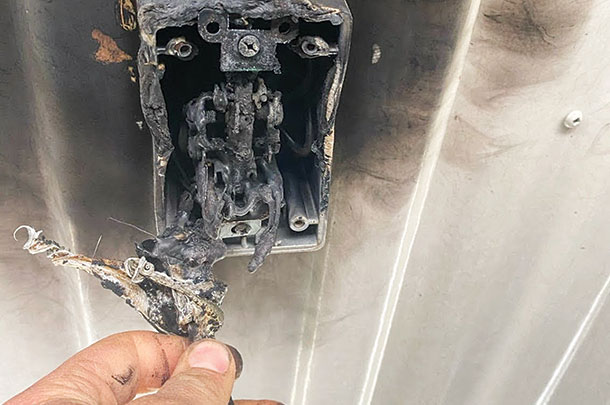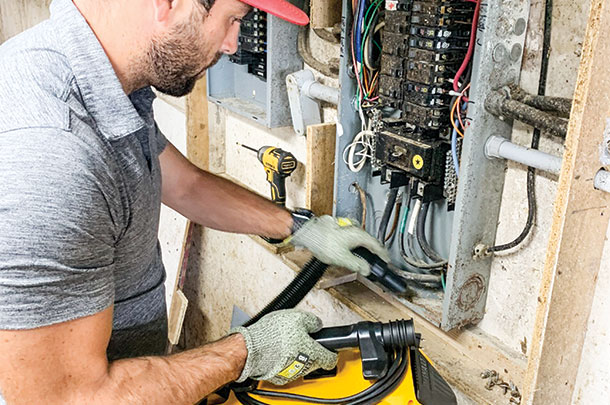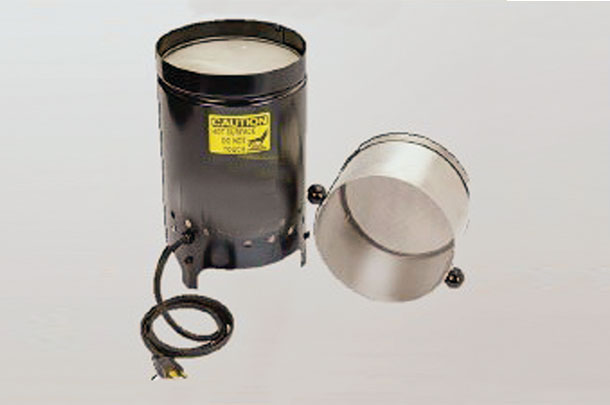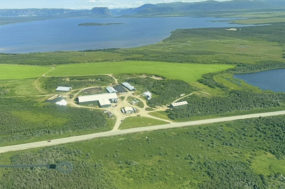Farm fires aren’t a popular topic – nobody likes to imagine “what if.” For example, what if a fire takes out a barn, machinery shed, home or grain elevator?
No one wants to think about how their farm would recover from losing years and generations of hard work to build the business, genetic lines, irreplaceable memories and overall livelihood. Prevention against farm fires has never been a more important topic.
The numbers don’t lie. As farm values increase, so do the replacement costs if a fire, accident or disaster should occur. Farm fires also account for the most recorded financial losses in agricultural operations across Canada.
Faulty electrical systems leading cause of barn fires
A data analysis conducted by the Ontario Office of the Fire Marshal and Emergency Management concluded approximately 40% of all barn fires are caused by faulty electrical systems, one of the leading causes of barn fires. Their top prevention recommendation is regular inspections and maintenance to reduce the risk of a barn fire.
Electrical safety experts can help farmers reduce the risk of farm fires by providing an additional layer of protection with electrical monitoring, detection and diagnostic solutions. They understand how electrical faults and anomalies can cause fires or near close-calls and work with dairy farmers to prevent common electrical problems before they escalate to fires.
In my experience, prevention is mostly about awareness and applying the right corrective measure at the right time. Prevention equipment and detection make up for only 5% of the risk management equation. Preventative maintenance, access to field expertise, working with a licensed electrician and regular inspections are the real keys to reducing the risk of barn fires.
Electricians and electrotechnicians need to be focused on helping farmers manage risks in their operations and reduce the risk of fires. The willingness to correct something and not ignoring the issue or putting it off is the most important form of prevention. Too often, we get busy on the farm and delay or forget about something that requires a preventative fix – and if it’s ignored for too long, the problem can escalate until it’s too late. Beyond the simple notifications, experts can help ensure the presence of an action plan and provide knowledge and expertise throughout the diagnostic process and implementation of the right fix.
Real farm fire scenarios
Here’s a look at three client cases from our team. These are all common fire hazards on dairy farms we have seen over the years and, while electrical monitoring and service prevented each of these cases from escalating into a fire, all farmers can learn from these examples to prevent similar situations on their own farms.

Moisture build-up in a ceiling outlet caused an electrical fire. Photo courtesy of PrevTech Innovations Inc.
Case No. 1: Moisture and condensation
Moisture build-up in a ceiling outlet caused an electrical fire.
Problem
Moisture and condensation build-up creates serious risk. Water can creep and seep into any area of a barn, including receptacles, junction boxes and outlets. And as moisture builds up, corrosion occurs. This can lead to the breakdown of anything along a farm’s electrical network.
Prevention tips
This problem most commonly occurs after pressure washing a barn or cleaning an area when water can easily get into critical electrical areas. Be sure to closely monitor your farm’s electrical system for at least a week following any cleaning or pressure washing in a barn. Moisture also builds up in areas that are commonly washed like milking parlours or milkhouses that can be home to main electrical areas. Regular inspections and maintenance should be part of a routine. Watch for any unusual water or moisture build-up or corrosion on receptacles, junction boxes and outlets. And if you see any, contact your electrician to resolve the problem immediately before it escalates.

Cleaning out the panel box, removing anything combustible like dust, rodent nests and debris should be part of scheduled fire prevention. Photo courtesy of PrevTech Innovations Inc.
Case No. 2: Electrical room maintenance
Maintaining your electrical room, including panel boxes and breakers, is your first line of defence against the threat of faulty electrical systems and fires.
Problem
Electrical rooms are the heart of your farm’s electrical network. This room is home to your panel boxes and breakers that often work at above normal working condition temperatures. Poorly ventilated electrical rooms are a serious problem. Without proper ventilation, the constant heat can cause premature aging and decay of your farm’s electrical network. This can lead to constant repairs or replacement of equipment.
Prevention tips
Breakers are your first line of defence against electrical anomalies like a short circuit. When a breaker is tripped, it closes a channel or interrupts the circuit, providing a necessary protection point against serious problems or the threat of a fire. That’s why it’s important to properly ventilate an electrical room, reducing the risk of heating and compromising your panel box. Keeping the room clean and unobstructed is important, too. Don’t let an electrical room become a default storage area or fill it with anything combustible. Regular maintenance is also important to ensure everything within the room is healthy and functioning properly.

Silage moisture testers are important to assess feed quality, but they can be a common fire hazard on a dairy farm. Photo courtesy of PrevTech Innovations Inc.
Case No. 3: The dangers of silage dryers
Unattended silage dryers are serious fire hazards.
Problem
Whenever you combine a heating element, a fan and a combustible, like silage, you’ve got a fire risk. And if you leave an operating silage dryer unattended, you’ve got a serious risk. Silage moisture testers are important to assess feed quality, but they can be a common fire hazard on a dairy farm.
Prevention tips
Always make sure a silage dryer is in good operating condition before use. From an electrical perspective, proper maintenance and inspections are essential to preventing equipment malfunction or problems. Be mindful when operating silage dryers, never leave them unattended and use in open areas, outside of main farm buildings or somewhere with plenty of natural ventilation to avoid heating.
Preventative maintenance makes a difference
The most important thing farmers can do to prevent the risk of fire from electrical issues is regular maintenance and inspections with a licensed electrician. I always recommend farmers schedule an annual walk-through with their electrician that starts with the panel box because the vibration and heat can cause breakers to move, to dilate and contract, resulting in loose screws and cables. This creates resistive connections which may lead to arcing (very high temperature sparks). The first step to correct these common problems is to start by tightening connection points on each breaker and main breaker lugs and clean out the panel box, removing anything combustible like dust, rodent nests and debris.
Don’t forget to check main switches and transfer switches when you are conducting your regular inspection, too. Main switches are rarely opened because they are regulated, but they also require attention and maintenance. A visual inspection will assess the proper rating and positioning of the main fuses and potentially reveal colouration and blemishes that are signs of hazardous hotspots.
It’s important this work should be done by a qualified and licensed electrician while following required rules and safety guidelines. Another professional you can reach out to for prevention and assistance is your insurance company. Many farm insurance providers have a loss prevention team that are willing to help, and some provide a thermography program you could benefit from.
Prevention is key to reducing farm fires. It includes working with a team of professionals, using the right tools and equipment for the job, a willingness to properly address problems by working with a licensed electrician and making the time to repair issues. Being aware of your risks and taking a sound, supported approach to reduce those risks is your best defence against farm fires.









